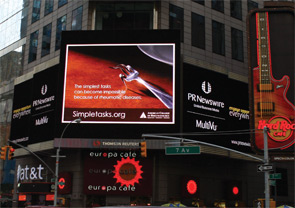
It’s hard to believe that 11 months ago I was addressing you for the first time as president of the ACR and highlighting my priorities for the year, guided by the ACR strategic plan. As I end my presidency, I want to spotlight a selection of our accomplishments, while recognizing the future challenges that remain for our profession and the ACR. These projects show the ACR’s ongoing commitment to address the concerns of the profession, our membership of rheumatologists and rheumatology health professionals, and especially our patients.
Rheumatology at the Macro Level
The launch of Simple Tasks—the ACR’s first public relations (PR) campaign—was one of the ACR’s greatest accomplishments in 2011. One of the goals of the campaign is to increase understanding of the severity of rheumatic diseases and of the importance of seeing a rheumatologist in their treatment. The initial component of the campaign is aimed at “influencers,” the people and groups making significant decisions that affect the rheumatology community. These influencers are legislators and administration officials, referring physicians and physician groups, advocacy groups, and think tanks.
Given the legislative audience, the campaign launched in September in conjunction with Advocates for Arthritis in Washington, D.C. Member and patient advocates promoted the campaign on the Hill by wearing campaign buttons, distributing campaign materials, and discussing the importance of rheumatology. As we visited congressional offices, we opened newspapers like The Hill and Roll Call, highlighting the ads promoting the Simple Tasks campaign. The symbolism of the bent prongs of the fork was quickly recognized by legislators and staff members. The visuals helped make our message “real” to those who did not understand the disability associated with rheumatic diseases. I believe that this publicity effort is off to a great start. The challenge will be to continue to have the impact we expect over the subsequent four years of this effort. Someday the word “rheumatology” will be well known and we will not have to answer the question of, “Who are you?” Then we will know that our campaign has been successful. You can learn more about the campaign by visiting www.SimpleTasks.org.

ACR Advocacy Making a Difference
Outside of promoting our new PR campaign, more than 100 rheumatologists, health professionals, and patients met with members of Congress during Advocates for Arthritis to share their stories and concerns about issues affecting our practices and patients every day, including:
- Preserving patient access to treatment;
- Maintaining funding levels for medical research; and
- Preserving patient access to care by permanently repealing the Sustainable Growth Rate.
From my experiences during the more than 12 years that I have been going to the Hill with the ACR, I can tell that progress is being made. Initially, we would need to spend valuable time at every office identifying our professional organization and the type of patients we treated. In 2011, the ACR is recognized by each legislative office as an informed medical organization that is knowledgeable of the health issues confronting our government. We are advancing rheumatology through our advocacy efforts and Congress is listening to us. They acknowledge that a 29.5% Medicare reimbursement cut is unacceptable and will affect our patients’ access to care. The future challenges for the ACR are to remain steadfast in its efforts to influence policy to the benefit of our profession and our patients in a constantly changing political climate. I encourage each of you to visit the advocacy booth at the ACR/ARHP Annual Scientific Meeting in Chicago this November and use the legislative action center—or better yet, call your senators and representatives today. Make your voice heard!
Pain Education and Relationship Building
Pain and pain management was another key area of focus for the ACR in 2011. Rheumatologists must consider pain in order to be proactive in meeting the needs of our patients. The ACR addressed this need by providing education that focused on pain and pain management. The 2011 ARHP Clinical Focus Course concentrated on pain management to help rheumatology health professionals be more effective in treating patients’ pain, and the ACR held 17 sessions related to pain at the annual meeting in Chicago. Outside of education, many ACR standing committees began incorporating pain issues into their program of work and provided updates at board meetings. The challenge is to continue this effort, because attention to the treatment of musculoskeletal pain will make us essential to the comfort of our patients and a valued resource at a time of limited finances.